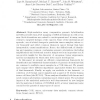Free Online Productivity Tools
i2Speak
i2Symbol
i2OCR
iTex2Img
iWeb2Print
iWeb2Shot
i2Type
iPdf2Split
iPdf2Merge
i2Bopomofo
i2Arabic
i2Style
i2Image
i2PDF
iLatex2Rtf
Sci2ools
132
click to vote
RECOMB
2007
Springer
2007
Springer
Framework for Identifying Common Aberrations in DNA Copy Number Data
High-resolution array comparative genomic hybridization (aCGH) provides exon-level mapping of DNA aberrations in cells or tissues. Such aberrations are central to carcinogenesis and, in many cases, central to targeted therapy of the cancers. Some of the aberrations are sporadic, one-of-a-kind changes in particular tumor samples; others occur frequently and reflect common themes in cancer biology that have interpretable, causal ramifications. Hence, the difficult task of identifying and mapping common, overlapping genomic aberrations (including amplifications and deletions) across a sample set is an important one; it can provide insight for the discovery of oncogenes, tumor suppressors, and the mechanisms by which they drive cancer development. In this paper we present an efficient computational framework for identification and statistical characterization of genomic aberrations that are common to multiple cancer samples in a CGH data set. We present and compare three different algorith...
CGH Data Set | Comparative Genomic Hybridization | Computational Biology | Efficient Computational Framework | RECOMB 2007 |
Related Content
| Added | 03 Dec 2009 |
| Updated | 03 Dec 2009 |
| Type | Conference |
| Year | 2007 |
| Where | RECOMB |
| Authors | Amir Ben-Dor, Doron Lipson, Anya Tsalenko, Mark Reimers, Lars O. Baumbusch, Michael T. Barrett, John N. Weinstein, Anne-Lise Børresen-Dale, Zohar Yakhini |
Comments (0)

